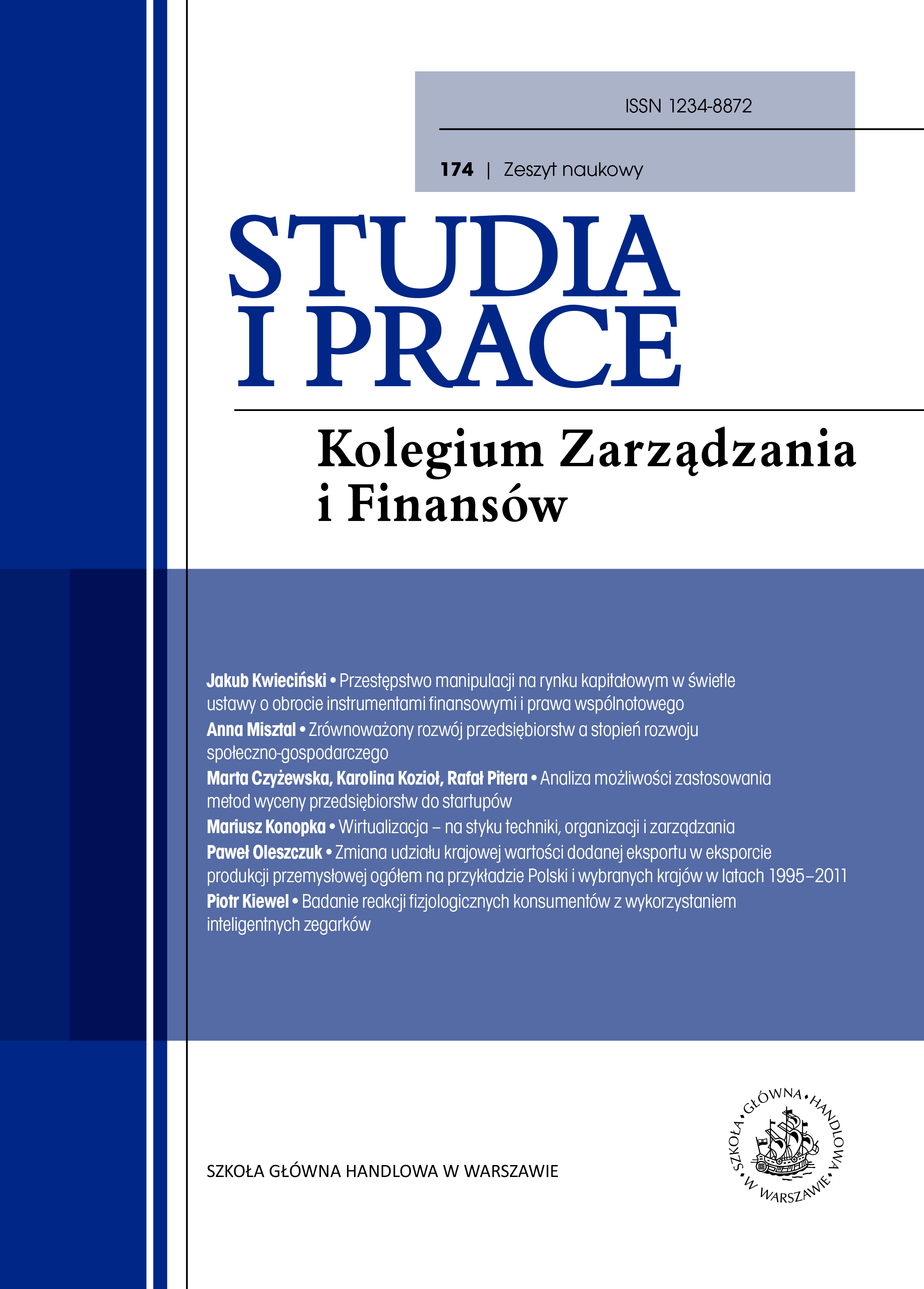Sustainable Growth of Enterprises and Social and Economic Growth
DOI:
https://doi.org/10.33119/SIP.2019.174.2Keywords:
sustainable growth, analysis of enterprises, Central and Eastern EuropeAbstract
This paper analyses the impact of the level of social and economic growth in countries of Central and Eastern Europe on the sustainable growth of enterprises. Studies were conducted in Poland, the Czech Republic, Slovakia, Lithuania, Latvia and Estonia between 2008 and 2017. The question of sustainable development is especially relevant in the times of changes taking place in global economies also in relation with climate change and its negative impact on societies. Opening considerations discuss fundamental issues connected with sustainable growth, further sections of the paper contain the description and results of the study. In accordance with the results, in most cases covered by the study, with the exception of Latvia, we reported high statistical dependence between the variables; moreover, in all countries sustainable growth indicator for enterprises exhibited an upward trend.
Downloads
References
2. Borys T. [2010], Koncepcja zrównoważonego rozwoju w naukach ekonomicznych, w: Ekonomia zrównoważonego rozwoju. Zarys problemów badawczych i dydaktycznych, red. B. Poskrobko, Wydawnictwo WSE, Białystok.
3. Boudreau J., Ramstad P. [2005], Talentship, Talent Segmentation, and Sustainability: A New HR Decision Science Paradigm for a New Strategy Definition, „Human Resource Management”,
no. 44 (2).
4. Ciegis R. [2009], The Concept of Sustainable Development and its Use for Sustainability Scenarios, „Inzinerine Ekonomika-Engineering Economics”, vol. 20, no. 2.
5. Ciegis R., Zeleniute R. [2008], Ekonomikosplėtradarnausvystymosi aspektu, „Taikomoji ekonomika: sisteminiaityrimai”, no. 2 (1).
6. Dvořáková L., Zborková J. [2013], Integration of Sustainable Development at Enterprise Level, „Procedia Engineering”, no. 69.
7. Dyllick T., Hockerts K. [2002], Beyond the Case for Corporate Sustainability, „Bus Strat Environ”, no. 11.
8. Emas R. [2015], The Concept of Sustainable Development: Definition and Defining Principles, Brief for GSDR.
9. Górka K. [2007], Wdrażanie koncepcji rozwoju zrównoważonego i trwałego, „Ekonomia i Środowisko”, nr 2 (32).
10. Grabara J., Bajdor P., Mihaescu L. [2015], Steps of Sustainable Development Implementation into Enterprise Activities, „Management of Sustainable Development”, vol. 7, no. 1.
11. Grudzewski W. M., Hejduk I. K., Sankowska A., Wańtuchowicz M. [2010], Sustainability w biznesie, czyli przedsiębiorstwo przyszłości – zmiany paradygmatów i koncepcji zarządzania, Poltext, Warszawa.
12. Gryga K. [2016], Społeczna odpowiedzialność biznesu jako narzędzie zrównoważonego rozwoju w przedsiębiorstwie górniczym, „Prace Naukowe Uniwersytetu Ekonomicznego we Wrocławiu”, nr 454.
13. http://eurostat.gov.pl
14. http://hdr.undp.org
15. http://stat.gov.pl/zrownowazony-rozwoj/idea-zrownowazonego-rozwoju/
16. Kistowski M. [2003], Regionalny model zrównoważonego rozwoju i ochrony środowiska Polski a strategie rozwoju województw, Uniwersytet Gdański, Bogucki Wydawnictwo Naukowe,
Gdańsk–Poznań.
17. Kolk A., Tulder R. [2010], International Business, Corporate Social Responsibility and Sustainable Development, „International Business Review”, nr 19, z. 2.
18. Kozłowski S. [2007], Przyszłość ekorozwoju, wyd. II, Wydawnictwo KUL, Lublin.
19. Lorek E. [2015], Zrównoważony biznes podstawą budowy zielonej gospodarki – dokonania i perspektywy rozwoju, w: Biznes ekologiczny – Ekorynek, ekokonsument, ekostrategie
firm, red. E. Lorek, Wydawnictwo Uniwersytetu Ekonomicznego w Katowicach, Katowice, s. 116– 128.
20. Majewski E. [2008], Trwały rozwój i trwałe rolnictwo – teoria i praktyka gospodarstw rolniczych, SGGW, Warszawa.
21. Mazur-Wierzbicka E. [2005], Koncepcja zrównoważonego rozwoju jako podstawa gospodarowania środowiskiem przyrodniczym, w: Funkcjonowanie gospodarki polskiej w warunkach
integracji i globalizacji, red. D. Kopycińska, Katedra Mikroekonomii Uniwersytetu Szczecińskiego, Szczecin.
22. Meadows D. H. [1998], Indicators and Information Systems for Sustainable Development. A Report to the Balaton Group, The Sustainability Institute.
23. Nowak E. [1995], Rachunkowość menedżerska, Wydawnictwo Akademii Ekonomicznej im. Oskara Langego we Wrocławiu, Wrocław.
24. Paehlke R. [2005], Sustainability as a Bridging Concept, „Conservation Biology”, vol. 19, no. 1.
25. Pearce D., Turner R. K. [1990], Economics of Natural Resources and Environment, Harvester Wheatsheaf, New York.
26. Poskrobko B. [2009], Współczesne trendy cywilizacyjne a idea zrównoważonego rozwoju, „Przegląd Komunalny”, nr 6.
27. Ranganathan S., Swain R. B. [2018], Sustainable Development and Global Emission Targets: A Dynamical Systems Approach to Aid Evidence Based Policy Making, „Sustainable
Development”.
28. Ruzevicius J., Serafinas D. [2007], The Development of Socially Responsible Business in Lithuania, „Engineering Economics”, no. 1.
29. Sterling, S. [2010], Learning for Resilience, or the Resilient Learner? Towards a Necessary Reconciliationin a Paradigm of Sustainable Education, „Environmental Education Research”, no. 16.
30. Strange T., Bayley A. [2008], Sustainable Development Linking Economy, Society, Environment, OCED.
31. Strezov V., Evans A., Evans T. J. [2017], Assessment of the Economic, Social and Environmental Dimensions of the Indicators for Sustainable Development, „Sustainable Development”,
no. 25, z. 3.
32. Sztumski W. [2006], Idea zrównoważonego rozwoju a możliwości jej urzeczywistnienia, „Problemy Ekorozwoju”, vol. 1, nr 2.
33. Tracey S., Bayley A. [2008], OECD Insights Sustainable Development Linking Economy, Society, Environment: Linking Economy, Society, Environment, OECD.
34. Trojanowski T. [2015], Przedsiębiorstwa wobec wyzwań zrównoważonego rozwoju, „Zeszyty Naukowe Politechniki Śląskiej. Organizacja i Zarządzanie”, z. 77.
35. Vare P., Scott W. [2007], Learning for a Change: Exploring the Relationship Between Education and Sustainable Development, „Journal of Education for Sustainable Development”, 1 (2).
36. Weidinger C. [2014], Business Success through Sustainability. In Sustainable Entrepreneurship, Springer, Berlin–Heidelberg.









